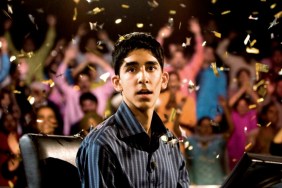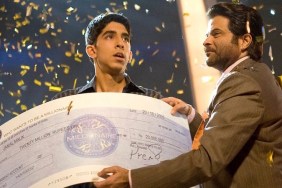Cast:
Dev Patel as Jamal Malik
Freida Pinto as Latika
Saurabh Shukla as Sergeant Srinivas
Anil Kapoor as Prem Kumar
Raj Zutshi as Director
Irrfan Khan as Police Inspector
Ayush Mahesh Khedekar as Youngest Jamal
Azharuddin Mohammed Ismail as Youngest Salim
Tanay Hemant Cheeda as Middle Jamal
Ashutosh Lobo Gajiwala as Middle Salim
Rubina Ali as Youngest Latika
Sanchita Choudhary as Jamal’s Mother
Directed by Danny Boyle and Loveleen Tandan
Summary:
Mixing Bollywood sensibilities with Danny Boyle’s clever style of filmmaking, “Slumdog Millionaire” is the type of cinematic revelation that only comes along once or twice a year.
Story:
Jamal Malik (Dev Patel), a young man from Mumbai, has made it onto “Who Wants to be a Millionaire?” as a contestant. As he gets every single answer right, the show’s host (Anil Kapoor) starts to get suspicious, and calls in the police to interrogate the boy and find out how he cheated. Through his questioning, we learn about Jamal’s childhood surviving in the slums of Bombay with his older brother Salim, and how their relationship was altered when a young orphan girl named Latika entered the picture. All of these fantastic experiences shaped Jamal’s life as he never gave up looking for Latika after being separated from her and Salim as a teenager.
Analysis:
By now, one should learn never to underestimate director Danny Boyle, because his entire filmography so far has been building up to making what could possibly be his magnum opus, the movie that will define the rest of his career as a filmmaker. That might be a bold statement to make, but even those who’ve closely followed Boyle’s career might be surprised by the new level of filmmaking he achieves with this loose adaptation of Vikas Swarup’s novel “Q&A.” As much as it might feel like a departure, one can certainly see elements from Boyle’s past films whether it’s the distinctive editing and use of music seen in “Trainspotting” or “28 Days Later” or the ability to elicit believable performances out of young child actors as seen in the underrated “Millions.”
Working from a terrific script by Simon Beaufoy (“The Full Monty”), one that incorporates many divergent story elements in a surprisingly organic way, the film introduces its protagonist, Dev Patel’s Jamal Malik, as he’s in the hot seat for “Who Wants to be a Millionaire?” This familiar scene is broken up with a scene of a brutal police investigation trying to find out how Jamal cheated to get the answers. Through this interrogation, we flashback to Jamal’s childhood trying to survive in the slums of Bombay with his older brother Salim, an opportunistic boy always coming up with schemes for them to make money. Jamal clearly idolizes his older brother, a loyalty that Salim takes advantage of to cheat his younger brother out of any happiness. This situation comes to a head when they meet Latika, an orphaned girl who gravitates and bonds with the younger brother, causing the jealous Salim to leave the girl behind as they escape from a Fagan-like character using orphans for criminal means. The trio are reunited years later when Jamal and Salim save Latika from a life of prostitution, but the bitter feelings between the brothers resurfaces as they’re once separated. Years later, Salim’s anger has driven him further into the world of crime while still trying to find forgiveness for his sins, while Jamal gets a job as a tea boy at a busy call center. He still hasn’t forgotten Latika, and his attempts to find her and reconnect with Salim leads to him getting onto the game show.
That’s a very simple synopsis of what’s essentially a rich and intricate tale of how the lives of three kids from the slums of Bombay become intertwined. Being set in India already makes “Slumdog” distinctive from Boyle’s previous work, but what makes the film so memorable is the inventive way Jamal’s experiences are relayed in a way that owes little to either Bollywood or traditional Western cinema.
Much of the film cleverly juxtaposes Jamal being grilled on the game show with his interrogation by the police inspector, played by Irrfan Khan (“The Namesake”), a device that keeps things moving briskly. In both cases, the exchanges between Dev Patel and his interrogators are as entertaining as Jamal and Salim’s adventures as kids, and it’s fun to watch Khan become less menacing while at the same time, Anil Kapoor’s host Prem Kumar becomes more antagonist towards Jamal, aggravated at the thought of a “slumdog” walking away with millions of his dollars, Kapoor smiles liking the Cheshire Cat while on camera but clearly unhappy about the situation behind the scenes.
Patel will certainly get a lot of attention for making Jamal such a likeable character you want to see go all the way and deservedly so, and he has a couple of wonderful scenes with Freida Pinto as the older Latika. One must be equally impressed by the child actors Boyle found to play the younger characters, especially Ayush Mahesh Khedekar, who’s just delightful as the young Jamal, throwing himself into all sorts of funny situations. He’s followed by an equally expressive older actor once the story jumps forward four years and changes location to the area surrounding the Taj Mahal, where the boys learn how to trick tourists out of their money. The naturalistic performances given by these talented young actors makes the adventures and horrors Jamal experiences as a child seem more real.
Those who haven’t seen any of Boyle’s past films might have trouble adjusting to the rapid editing and loud music Boyle uses to make every scene jump out of the screen, mixing traditional Indian music with more familiar pop songs. M.I.A’s overused hit “Paper Planes” is actually used in a far more interesting way here, since the band’s Sri Lankan roots feel right at home. Boyle also found some amazing locations for the slums of Bombay, effectively showing its transformation into the industrialized modern city of Mumbai, which plays a large part in the evolution of the characters.
This fascinating story leads to a huge ending where Jamal’s success on the game show has become a phenomenon with millions of people tuning in to see if this slumkid can win all the money and be reunited with the girl he loves. It’s the type of inspirational ending some might find too hokey or pat, but it’s the most satisfying resolution one could have to the elaborate epic leading up to it. Such a joyful celebration of life and love can only be topped by a full-scale Bollywood musical number, which is exactly what we get as the end credits roll.
The Bottom Line:
Danny Boyle has outdone himself with this somewhat unconventional love story that combines classic storytelling and filmmaking techniques with Boyle’s singular ability to switch styles as necessary to create an innovative cinematic mélange. Clearly one of the best movies of the year, “Slumdog Millionaire” is a fine example of why we love to watch movies.










